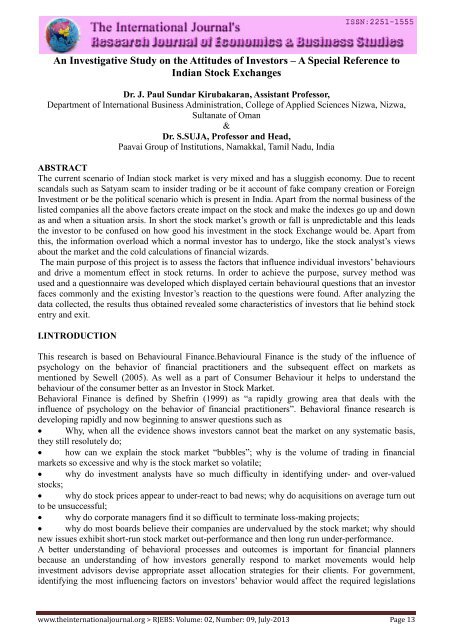Research Journal of Economics & Business Studies - RJEBS - The ...
Research Journal of Economics & Business Studies - RJEBS - The ...
Research Journal of Economics & Business Studies - RJEBS - The ...
You also want an ePaper? Increase the reach of your titles
YUMPU automatically turns print PDFs into web optimized ePapers that Google loves.
An Investigative Study on the Attitudes <strong>of</strong> Investors – A Special Reference to<br />
Indian Stock Exchanges<br />
Dr. J. Paul Sundar Kirubakaran, Assistant Pr<strong>of</strong>essor,<br />
Department <strong>of</strong> International <strong>Business</strong> Administration, College <strong>of</strong> Applied Sciences Nizwa, Nizwa,<br />
Sultanate <strong>of</strong> Oman<br />
&<br />
Dr. S.SUJA, Pr<strong>of</strong>essor and Head,<br />
Paavai Group <strong>of</strong> Institutions, Namakkal, Tamil Nadu, India<br />
ABSTRACT<br />
<strong>The</strong> current scenario <strong>of</strong> Indian stock market is very mixed and has a sluggish economy. Due to recent<br />
scandals such as Satyam scam to insider trading or be it account <strong>of</strong> fake company creation or Foreign<br />
Investment or be the political scenario which is present in India. Apart from the normal business <strong>of</strong> the<br />
listed companies all the above factors create impact on the stock and make the indexes go up and down<br />
as and when a situation arsis. In short the stock market’s growth or fall is unpredictable and this leads<br />
the investor to be confused on how good his investment in the stock Exchange would be. Apart from<br />
this, the information overload which a normal investor has to undergo, like the stock analyst’s views<br />
about the market and the cold calculations <strong>of</strong> financial wizards.<br />
<strong>The</strong> main purpose <strong>of</strong> this project is to assess the factors that influence individual investors’ behaviours<br />
and drive a momentum effect in stock returns. In order to achieve the purpose, survey method was<br />
used and a questionnaire was developed which displayed certain behavioural questions that an investor<br />
faces commonly and the existing Investor’s reaction to the questions were found. After analyzing the<br />
data collected, the results thus obtained revealed some characteristics <strong>of</strong> investors that lie behind stock<br />
entry and exit.<br />
I.INTRODUCTION<br />
This research is based on Behavioural Finance.Behavioural Finance is the study <strong>of</strong> the influence <strong>of</strong><br />
psychology on the behavior <strong>of</strong> financial practitioners and the subsequent effect on markets as<br />
mentioned by Sewell (2005). As well as a part <strong>of</strong> Consumer Behaviour it helps to understand the<br />
behaviour <strong>of</strong> the consumer better as an Investor in Stock Market.<br />
Behavioral Finance is defined by Shefrin (1999) as “a rapidly growing area that deals with the<br />
influence <strong>of</strong> psychology on the behavior <strong>of</strong> financial practitioners”. Behavioral finance research is<br />
developing rapidly and now beginning to answer questions such as<br />
Why, when all the evidence shows investors cannot beat the market on any systematic basis,<br />
they still resolutely do;<br />
how can we explain the stock market “bubbles”; why is the volume <strong>of</strong> trading in financial<br />
markets so excessive and why is the stock market so volatile;<br />
why do investment analysts have so much difficulty in identifying under- and over-valued<br />
stocks;<br />
why do stock prices appear to under-react to bad news; why do acquisitions on average turn out<br />
to be unsuccessful;<br />
why do corporate managers find it so difficult to terminate loss-making projects;<br />
why do most boards believe their companies are undervalued by the stock market; why should<br />
new issues exhibit short-run stock market out-performance and then long run under-performance.<br />
A better understanding <strong>of</strong> behavioral processes and outcomes is important for financial planners<br />
because an understanding <strong>of</strong> how investors generally respond to market movements would help<br />
investment advisors devise appropriate asset allocation strategies for their clients. For government,<br />
identifying the most influencing factors on investors’ behavior would affect the required legislations<br />
www.theinternationaljournal.org > <strong>RJEBS</strong>: Volume: 02, Number: 09, July-2013 Page 13
















